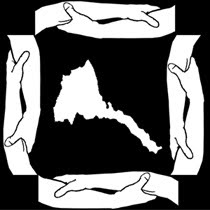domenica 2 gennaio 2011
Fears over African migrants held by Sinai Bedouin
African migrants gather in the Sinai before attempting the perilous journey to Israel
Human rights groups say Bedouin smuggling gangs are holding over a hundred African migrants for ransom in the Sinai desert. The BBC's Rupert Wingfield-Hayes has had rare access to smugglers close to the Israeli border.
Dusk is falling across the desert as we arrive at our rendezvous. It has taken five hours to get here from Cairo via a circuitous route to avoid the Egyptian police checkpoints.
We draw up beside a white, Toyota four-wheel drive. The window rolls down to reveal the face of a handsome, Bedouin man with a carefully trimmed beard and a red and white kefiyyah scarf on his head.
"Follow me," he shouts in Arabic and we head off again, this time into the sand dunes and gathering gloom.
Half-an-hour later I am sitting beside a crackling fire inside a Bedouin tent with five men. They are all people smugglers.
It is not the Bedouin way to hurry. First we must drink tea. Our hosts are exquisitely polite, but it is more than two hours before we can finally broach the subject we have come to talk about.
"We have heard that Africans are being held for ransom out here and that women have been raped and men killed," we say.
Their answers are evasive.
"We hear of such tragedies," one man states, "there are people in this business who mistreat migrants."
"It is a very hard journey," he adds. "Some migrants die along the way from thirst or exhaustion."
We press them about reports that people are being held hostage.
"Often the Africans do not have any money," the man answers, "but we still have to feed and house them. Out of 30 maybe only 10 can pay. In this situation we lose money."
Human cargo
As if to prove they do not mistreat their clients the smugglers then produce two young African men from out of the night.
One is barely past childhood. He tells me in broken English that his name is Amar, he is just 15 and from Eritrea.
As we talk, it rapidly becomes apparent that Amar is being held hostage.
AdvertisementMigrants crossing the desert are completely at the mercy of the Bedouin people smugglers
He has been waiting with the smugglers for a month to cross to Israel but they will not let him go until his family pays up.
"How much do they want?" I ask.
"Tonight my brother called to say he can send US $2000. They are trying to make a deal," Amar says.
Amar is well-dressed and shows no signs of mistreatment but as we sit and eat with our Bedouin hosts the two Eritreans are made to sit in the corner and watch.
They are not even offered a cup of tea.
It is a telling sign of how the smugglers view the African chattels.
Worsening abuse
If you want to get an idea of the full horror of what can happen out in the desert you have to cross the border to Israel.
African migrants get medical and legal assistance from Israeli NGOs There are over 30,000 African migrants in the country who have entered illegally from Egypt.
At a Tel Aviv clinic run by the group Physicians for Human Rights, there are hundreds of Eritreans, Ethiopians and Sudanese crowded into the waiting room.
One young woman from Ethiopia agrees to talk. She asks to be called Amira, although it is not her real name.
"We had been told to pay $2,000, but when we got to the Sinai they said the price was $3,000," Amira recalls. "Those who refused to pay were beaten."
She says the men were then forced to watch as their wives were raped in front of them.
"They would take me into the front of the pick-up and do whatever they liked with me. The distress of this was too much for my husband," Amira says and then falls into uncontrollable weeping.
More cases are coming to light like that of Amira who says she was raped in the desert "Oh my love," she cries. "Oh my sweetheart."
Depressed and weakened by the beatings and dehydration, Amira's husband died in the desert.
Doctors at the clinic are documenting more and more cases of this kind. More than a third of the migrant women they treat have been raped. A quarter of the migrants tell of being tortured.
"It is in order to extort money," says Dan Cohen, director of Physicians for Human Rights.
"The smugglers use different methods like torturing. The women are raped and men are buried in sand and left for days to put pressure on them and make the families send money."
More than a thousand Africans are staggering out of the desert to arrive in Israel each month, hoping to start a new life.
Yet the Sinai is huge and unforgiving.
There is no law out there and nobody knows for certain how many more African migrants are being held hostage, raped, or left to die along the desert trails.
Iscriviti a:
Commenti sul post (Atom)

Nessun commento:
Posta un commento